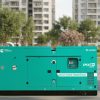In renewable energy, policy is rarely just paperwork. It’s a signal. A directional push. Sometimes, it’s the difference between cautious planning and confident scaling. Domestic renewable energy industry leaders are viewing the recent India-US trade agreement as exactly that kind of signal: a constructive step toward restoring stability in global trade and strengthening long-term supply linkages between the two countries.
For India’s solar renewable energyecosystem, this isn’t simply a trade headline. It is a strategic inflexion point that could reshape export competitiveness, reinforce supply chain partnerships, and accelerate India’s role as a trusted clean energy partner globally. The question isn’t whetherrenewable energy in India is growing. The deeper question is: how does India position itself in the next phase of global clean energy trade?
India-US Trade Agreement: A Step Toward Predictability
Renewable energy companies operate in a world where long-term planning is everything. Manufacturing capacity, project pipelines, and cross-border partnerships none of these thrive in uncertain tariff environments. Industry voices have highlighted that the improved tariff framework allows companies to reassess export strategies and strengthen long-term supply chain partnerships between India and the United States.
Sameer Gupta, Chairman of Jakson Group, characterised the recent India-US trade agreement as a significant move towards enhancing stability and predictability in global trade for Indian enterprises.
He stated, “The recent India-US trade agreement is a constructive step towards restoring stability and predictability in global trade for Indian businesses. The reduction in reciprocal tariffs improves export competitiveness and gives companies greater clarity to plan investments and scale operations over the long term.”
That word predictability matters. For a renewable energy company looking at multi-year capital commitments, predictability is as valuable as incentives.
Tariff Rationalisation: What It Means for Solar Renewable Energy Exports
One of the most significant elements being discussed is the rationalization of tariffs to 18 percent, which industry leaders see as a positive move for the solar sector.
The recent changes have enhanced price competitiveness and established clearer, more predictable market access to a major market. They emphasised that adjusting tariffs to a specific percentage is a significant benefit, as it improves competitiveness and facilitates more straightforward access to the market.
In practical terms, this could:
- Boost offtake for Indian solar manufacturers
- Support the scaling up of exports
- Deepen long-term supply linkages between the two nations
For solar renewable energy players, market access isn’t just about demand; it’s about sustainable, structured demand that supports capacity expansion. This is where trade alignment becomes a growth lever.
Strengthening India’s Role in the Global Clean Energy Supply Chain
The global demand for clean energy solutions is accelerating. India is no longer just meeting domestic renewable targets; it is increasingly being positioned as a global supplier and partner.
It was emphasised that as the demand for clean energy continues to rise globally, this agreement positions local solar companies effectively to capture growth opportunities and reinforces the country’s role as a trusted partner in the clean energy sector worldwide.
India is moving from being a market for renewable deployment to being a manufacturing and export engine for the clean energy transition, and trade frameworks like this help unlock that next stage.
Clean Energy Manufacturing Competitiveness: A Strategic Advantage
The reduction in tariffs is not only about exports, but it is also about competitiveness across the clean energy ecosystem.
A significant reduction in tariffs to 18 percent is especially important for the clean energy ecosystem, including solar manufacturing. This change enhances the country’s competitiveness in the US market and reinforces long-term growth and export potential.
This speaks to a broader industrial opportunity:
- India strengthens manufacturing depth
- Companies gain export confidence
- The renewable energy supply chain becomes more globally integrated
For renewable energy in India, manufacturing competitiveness is quickly becoming as important as generation capacity.
Business Confidence and Global Sentiment Around India Inc.
Trade agreements also shape perception. They influence how global markets view India’s growth trajectory.
The recent developments in major trade fronts enhance business predictability and reinforce global confidence in the growth trajectory of the country. This creates significant opportunities for businesses, as it accelerates positive sentiment toward the overall industry landscape.
That sentiment matters for renewable energy companies seeking:
- International capital
- Technology partnerships
- Cross-border supply agreements
- Large-scale expansion opportunities
Confidence is currency in global clean energy markets.
Where Jakson Fits Into This Renewable Energy Moment
As India’s renewable energy ecosystem matures, Jakson is operating at the intersection of manufacturing capability, solar deployment, and long-term strategic positioning. Our Hon’ble Chairman, Sameer Gupta’s statement reflects a broader industry reality: tariff clarity enables investment clarity.
For arenewable energy companyoperating in India’s solar segment, the ability to plan scale over the long term is not optional; it is foundational. This is the kind of environment where domestic clean energy players can transition into globally competitive partners.
Final Thoughts
Renewable energy in India is entering a phase where domestic scale is only one part of the story. The next chapter is global integration through exports, manufacturing strength, and trusted supply partnerships. The India-US trade agreement is more than a tariff adjustment. It is a constructive move toward stability, predictability, and long-term clean energy collaboration.
For solar renewable energy players, this could translate into stronger competitiveness, accelerated export momentum, and deeper supply chain alignment with one of the world’s most significant clean energy markets.









